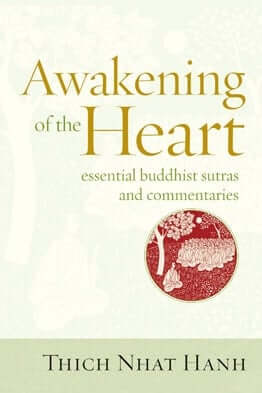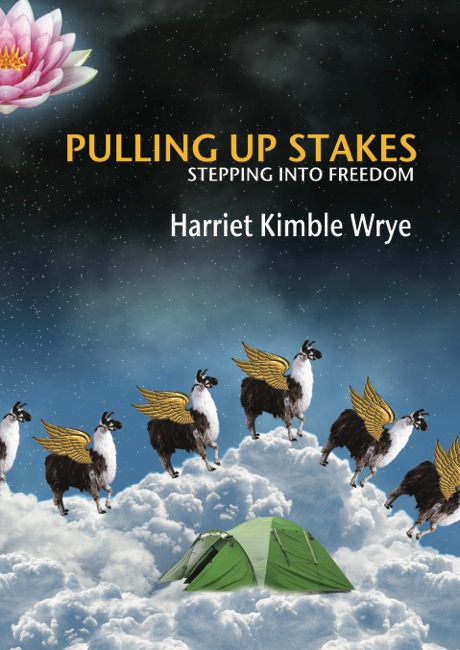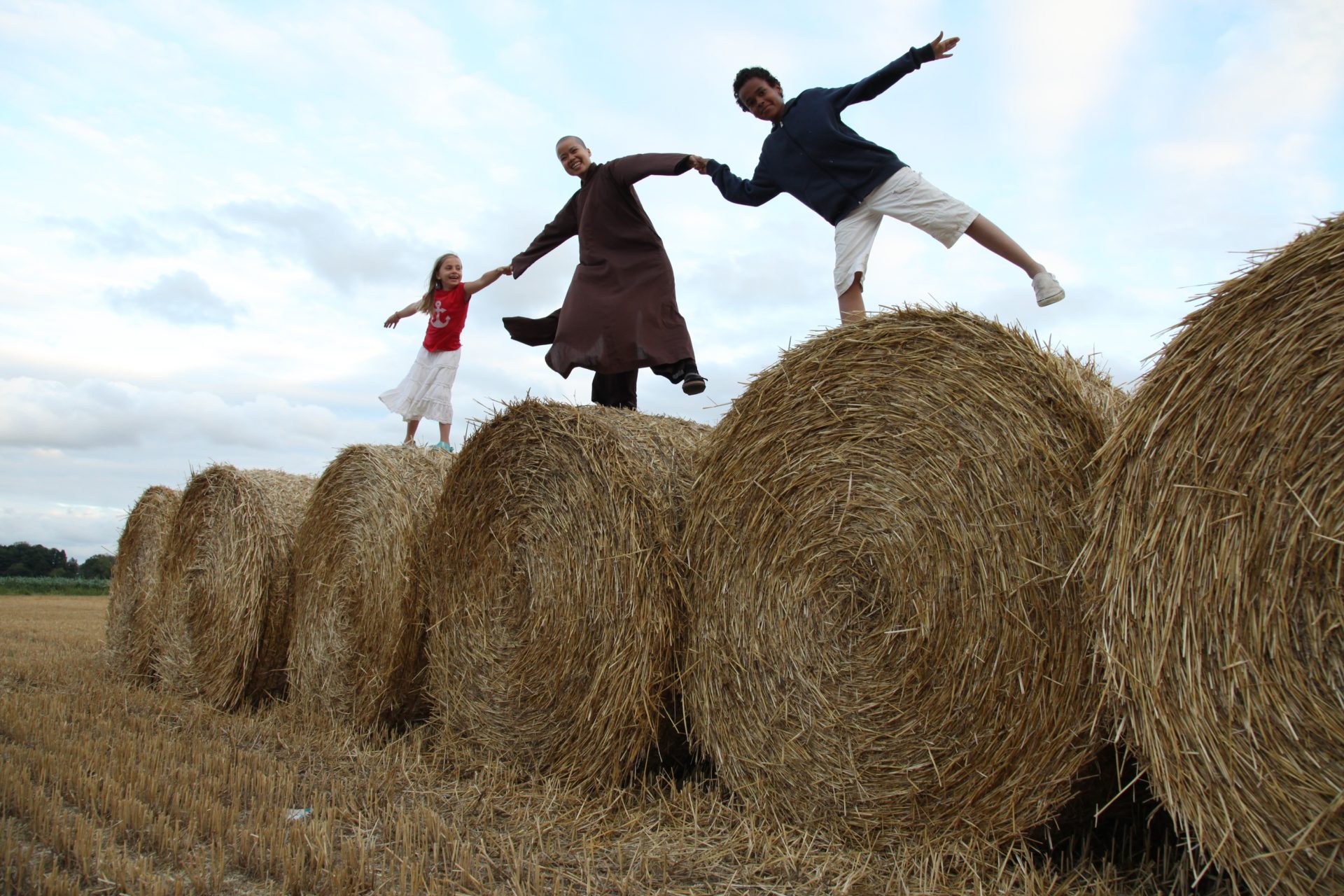
Awakening of the Heart
Essential Buddhist Sutras and Commentaries
Thich Nhat Hanh
Parallax Press, 2012
Softcover, 608 pages
Reviewed by Fred Eppsteiner, Brother True Energy
Several weeks ago, a Sangha member told me she was interested in delving more deeply into traditional Buddhist teachings and asked if I could suggest an anthology of Buddhist sutras.

Awakening of the Heart
Essential Buddhist Sutras and Commentaries
Thich Nhat Hanh
Parallax Press, 2012
Softcover, 608 pages
Reviewed by Fred Eppsteiner, Brother True Energy
Several weeks ago, a Sangha member told me she was interested in delving more deeply into traditional Buddhist teachings and asked if I could suggest an anthology of Buddhist sutras. Fortunately, I had Thay’s latest book in my hand and enthusiastically recommended it to her. For decades now, Thich Nhat Hanh has been known worldwide as a wonderful popularizer of core Buddhist teachings (especially mindfulness), with a rare genius for making these traditional teachings and practices understandable, accessible, and easily practiced by everyone.
It is less well known that Thay is a profound scholar of Buddhist philosophy, psychology, and history, and is deeply versed in the Buddhist sutras. For years, Parallax Press has published individual books of Thay’s translations and commentaries on these texts. These have now been gathered in the newly published anthology, Awakening of the Heart.
A unique feature of this anthology is that it contains sutras (or suttas) from both the Theravada and Mahayana traditions. Thay has always been a teacher and scholar who searched for common ground, even in relationship to the seeming differences in the canonical texts of the southern and northern schools of Buddhism. In 1966, when Thay founded the Order of Interbeing, he wrote in its Charter:
The Order of Interbeing does not consider any sutra or group of sutras as its basic scripture(s). It draws inspiration from the essence of the Buddhadharma in all sutras. It does not accept the systematic arrangements of the Buddhist teachings proposed by any school. The Order of Interbeing seeks to realize the spirit of the Dharma in early Buddhism, as well as in the development of that spirit through the history of the sangha, and its life and teachings in all Buddhist traditions.
The Order of Interbeing considers all sutras, whether spoken by the Lord Buddha or compiled by later Buddhist generations, as Buddhist sutras. It is also able to find inspiration from the texts of other spiritual traditions. It considers the development of original Buddhism into new schools a necessity to keep the spirit of Buddhism alive. Only by proposing new forms of Buddhist life can one help the true Buddhist spirit perpetuate.
This anthology is a fulfillment of his vision of a non-denominational developmental approach to Buddhist teachings. The book contains nine sutras combined with Thay’s commentary, often line-by-line. In these sparkling commentaries, the uniqueness of Thay’s capacities as a Dharma master continually shines. Sometimes he is the sutra master, presenting Buddhist philosophical tenets, historical antecedents, and psychological insights. Then he is the skillful modern teacher, using personal stories, anecdotes, and present-day insights and examples to enliven and illuminate the traditional formulations of the sutras. Finally, he is the meditation master, showing the reader the clear way to practice the teachings and inspiring him or her towards realization. What a joy!
In Thay’s commentary on the Diamond Sutra, he reminds his Western students that for traditional sutra teachings and practices to be relevant for today’s world, American Buddhism must be “built from your own experiences and with your own cultural ingredients.” For this integration to occur, we must be deeply acquainted with Buddhist foundational teachings and practices so as not to throw the proverbial baby out with the bath water. Reading Awakening of the Heart is a clear step towards the fulfillment of Thay’s heartfelt advice to us.

Pulling Up Stakes
Stepping into Freedom
By Harriet Kimble Wrye
Chanslor Press (Rare Bird Lit), 2011
Softcover, 426 pages
Reviewed by Victoria Emerson, True Sangha Mountain
Pulling Up Stakes is a travel guide to life. Born from the author’s sabbatical from her work as a psychoanalyst, this account of a riveting, off-the-beaten-path adventure is also a deeply spiritual reflection on mindful living. As the author journeys from the depths of her somatically buried fear to the summits of freedom from attachments, she provides readers with a road map for cultivating awareness and compassion in our own lives.
Wrye’s vivid descriptions of her encounters with foreign peoples and environments bring an intimate inclusiveness to the reader’s experience. We truly share in her adventures, whether she is cradling an infant orangutan or undergoing a frightening reception by “stone-age” tribesmen in the Borneo jungle. We experience her delightful first visit to Plum Village, as well as her terrifying brush with a scorpion before her ordination into the Order of Interbeing. As Wrye’s exploits bring repressed memories to the surface, her expert analysis creates a common ground to connect readers to our own traumas and healing.
The author describes forays into “the back of beyond”—Sir Walter Scott’s term for a remote place, real or imagined— from her ascent of Mt. Kilimanjaro to her odyssey through the Middle East, Asia, and South America. Along with Wrye, we learn many lessons: that wearing what the natives wear kindles compassion; that crossing into a land of disorienting rituals can remind us of the polyglot oneness of human existence; and that noble silence forges presence and peacefulness, even in first-time visitors to Plum Village.
In his endorsement of the book, Thich Nhat Hanh writes: “Full of compassion and wise vision, psychologist Harriet Wrye’s compelling adventures and spiritual pilgrim age in Pulling Up Stakes offer a map of how cultivating mindfulness can help us all to truly ‘Step into Freedom’ no matter who we are or what obstacles we face.” This book invites us to recognize that we are all capable of stepping into freedom and living the miracle of life. Visit www.pullingupstakesbook.com.

